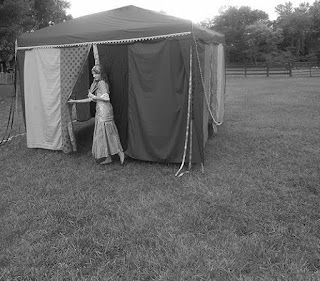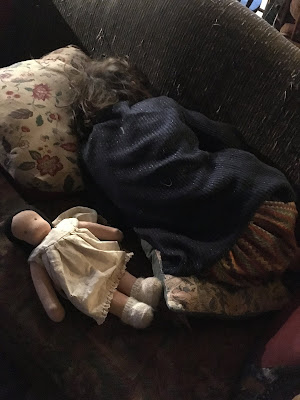Editing Alex: The Importance of the Read-Aloud
Alex O'Donnell and the Forty CyberThieves marks an important milestone for me: this the first book where the final edit involves reading it out loud to my own children. For one thing, I have two teenagers now (13 and almost-15), which is a somewhat nerve-wracking development. For another thing, Alex has turned out to be a surprisingly family-friendly book: my 6 year old and 10 year old are avidly following the story as well. (This should be good news to all the 14-year-old readers who are still waiting for parental permission to read The Midnight Dancers and Waking Rose!)
An important component of the final edit of a book is the Read-Aloud. Now, I confess that I haven't done an official read-aloud since Black as Night. Reading your manuscript out loud to a small audience is a great way to do a thorough edit quickly, and I bet it'll weed out typos better than Microsoft spellcheck. But there are other advantages to doing a Read-Aloud, which I'll list for those of you who are writers (or who want to be!).
Basically, the Read-Aloud has a way of making even the Writer (who is thoroughly familiar with the work) a Listener, and gives that crucial Outsider's Perspective that's so critical to the editing phase. But these are the aspects of the work that particularly stand out when you read it out loud to an audience:
1. Awkward phrasing.
If you can't read it out loud smoothly, you'd better rephrase it. Some of the manuscripts I see for Sophia Institute Press could be easily ironed out if only their authors read them out loud before submitting. If this is your bugaboo, start reading your early drafts out loud (hint: make a friend read it while you listen). Reading aloud the final draft will hopefully eliminate the clunkiness.
2. Inconsistencies
If someone stands up in the same paragraph (without sitting down in between) you or your audience will probably notice it. Also basic fact checks. ("Hey, you just said ten percent of a million bucks is $10,000: is that really true?")
3. Rhythmn
Andrew Pudewa opines that fine writing style comes by hearing, not from seeeing, the written word. Poetry and plays come alive only when they're read aloud. Same with a novel. Rhythmn, the "third dimension" of the novel, so to speak, is thrown into sharp relief when the book is spoken. If your writing has style, speaking will reveal it. If it doesn't, same thing.
I don't consider myself a particularly strong stylist. It's something I'm working on (and teen fiction is rather style-lite, so I don't work on it much). But the Read-Aloud is an invaluable aid to developing this intuitive writing virtue.
4. Humor
I'm not a very funny person, and the jokes I make in speech tend to be either a) lame or b) too esoterically subtle to be recognizable. Writing gives me a chance to actually try to sound funny, but it's still a lot of work for me. If you've read one of my books and laughed at something, chances are it's because I rephrased it and rephrased it and fiddled with it until it got a laugh out of me. Reading-aloud has a way of generating even better punchlines. Sometimes your audience might even suggest a better one for you. :) And on the basic level, humor is all about rhythmn, so see #3.
Some of the characters in Alex have rather corny humor (ie: like mine) but others actually need to be funny. And pulling the humor out of a situation is always tough. Working on humor in a manuscript, I find Mark Twain's aphorism is particularly appropriate: "The difference between the right word and the almost-right-word is the difference between the lightning and the lighning bug."
An important component of the final edit of a book is the Read-Aloud. Now, I confess that I haven't done an official read-aloud since Black as Night. Reading your manuscript out loud to a small audience is a great way to do a thorough edit quickly, and I bet it'll weed out typos better than Microsoft spellcheck. But there are other advantages to doing a Read-Aloud, which I'll list for those of you who are writers (or who want to be!).
Basically, the Read-Aloud has a way of making even the Writer (who is thoroughly familiar with the work) a Listener, and gives that crucial Outsider's Perspective that's so critical to the editing phase. But these are the aspects of the work that particularly stand out when you read it out loud to an audience:
1. Awkward phrasing.
If you can't read it out loud smoothly, you'd better rephrase it. Some of the manuscripts I see for Sophia Institute Press could be easily ironed out if only their authors read them out loud before submitting. If this is your bugaboo, start reading your early drafts out loud (hint: make a friend read it while you listen). Reading aloud the final draft will hopefully eliminate the clunkiness.
2. Inconsistencies
If someone stands up in the same paragraph (without sitting down in between) you or your audience will probably notice it. Also basic fact checks. ("Hey, you just said ten percent of a million bucks is $10,000: is that really true?")
3. Rhythmn
Andrew Pudewa opines that fine writing style comes by hearing, not from seeeing, the written word. Poetry and plays come alive only when they're read aloud. Same with a novel. Rhythmn, the "third dimension" of the novel, so to speak, is thrown into sharp relief when the book is spoken. If your writing has style, speaking will reveal it. If it doesn't, same thing.
I don't consider myself a particularly strong stylist. It's something I'm working on (and teen fiction is rather style-lite, so I don't work on it much). But the Read-Aloud is an invaluable aid to developing this intuitive writing virtue.
4. Humor
I'm not a very funny person, and the jokes I make in speech tend to be either a) lame or b) too esoterically subtle to be recognizable. Writing gives me a chance to actually try to sound funny, but it's still a lot of work for me. If you've read one of my books and laughed at something, chances are it's because I rephrased it and rephrased it and fiddled with it until it got a laugh out of me. Reading-aloud has a way of generating even better punchlines. Sometimes your audience might even suggest a better one for you. :) And on the basic level, humor is all about rhythmn, so see #3.
Some of the characters in Alex have rather corny humor (ie: like mine) but others actually need to be funny. And pulling the humor out of a situation is always tough. Working on humor in a manuscript, I find Mark Twain's aphorism is particularly appropriate: "The difference between the right word and the almost-right-word is the difference between the lightning and the lighning bug."


Comments
How do you approach this in your own books, and how do you approach it when looking at a manuscript for Sophia Press?